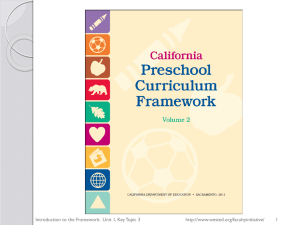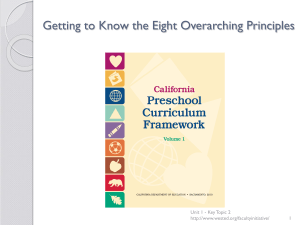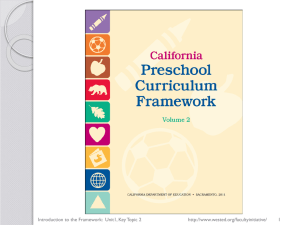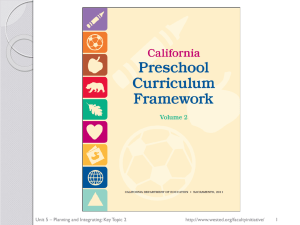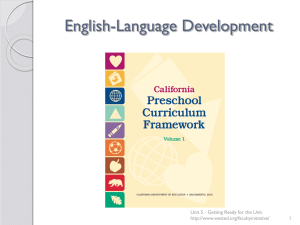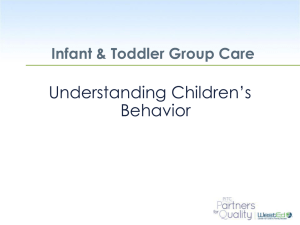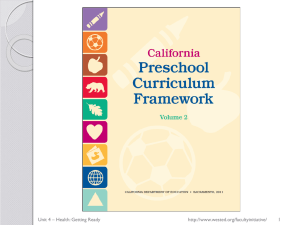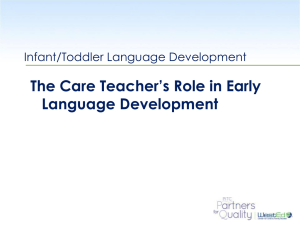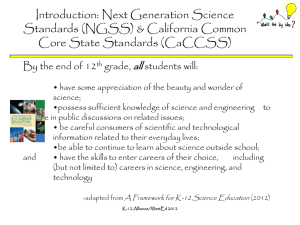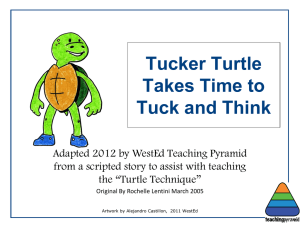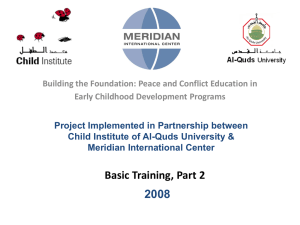Visual Art
advertisement
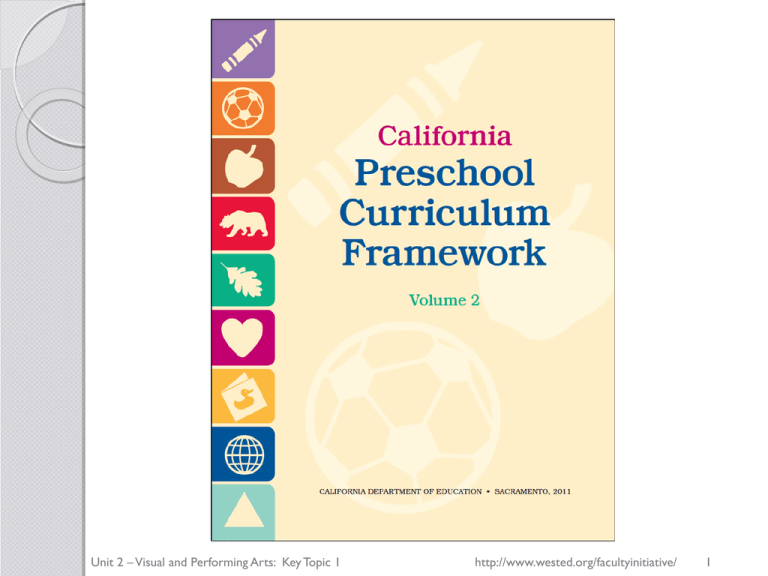
Unit 2 – Visual and Performing Arts: Key Topic 1 http://www.wested.org/facultyinitiative/ 1 Visual and Performing Arts The four disciplines defined, include: Visual Art: Products and processes of expression that use particular tools to create marks, colors, textures, and shapes of visual art. Music: Sounds selected and organized for expressive purposes; these sounds have pitch, tempo, rhythm, and tone. (pages 28-31) California Preschool Learning Foundations, Volume 2 Unit 2 – Visual and Performing Arts: Key Topic 1 http://www.wested.org/facultyinitiative/ 2 Visual and Performing Arts Drama: A participatory experience in which two or more children pretend to be someone else or someplace else. Drama, in the preschool classroom, is an experiential, play-based learning medium. Whereas theater is performanceoriented, drama is process-oriented and improvisational in nature. Dance: Movement selected and organized for aesthetic purposes or as a medium of expression, rather than for its function as work or play. (pages 28-31) California Preschool Learning Foundations, Volume 2 Unit 2 – Visual and Performing Arts: Key Topic 1 http://www.wested.org/facultyinitiative/ 3 Visual and Performing Arts Strands - Visual Art, Music, and Dance Substrand 1.0 Notice, Respond, and Engage Substrand 2.0 Develop Skills Substrand 3.0 Create, Invent, and Express Strand - Drama Substrand 1.0 Notice, Respond, and Engage Substrand 2.0 Develop Skills to Create, Invent, and Express Through Drama (pages 48-49) California Preschool Curriculum Framework,Volume 2 Unit 2 – Visual and Performing Arts: Key Topic 1 http://www.wested.org/facultyinitiative/ 4 Visual and Performing Arts California Preschool Curriculum Framework, Volume 2 Much of children’s development in the visual and performing arts during the preschool years occurs naturally. Many skills unfold through children’s play and are closely intertwined with those in other areas of development. Children follow their own interests and engage in areas where they are experiencing increasing mastery. Unit 2 – Visual and Performing Arts: Key Topic 1 http://www.wested.org/facultyinitiative/ 5 Visual and Performing Arts California Preschool Curriculum Framework, Volume 2 The role of the preschool teacher is to: Let children experiment by providing materials and opportunities, offer advice when requested, and provide scaffolding as appropriate. Support connections between the arts and other developmental areas Provide opportunities for children to grow and learn in relation to other developmental areas while practicing skills in the visual and performing arts. Unit 2 – Visual and Performing Arts: Key Topic 1 http://www.wested.org/facultyinitiative/ 6 Visual and Performing Arts California Preschool Curriculum Framework, Volume 2 Introduction to the chapter, pages 40–41 Research highlights, pages 59, 71, 84, 94, or 102 Glossary terms, pages 286–288 Note key points, ideas, and unfamiliar vocabulary. Unit 2 – Visual and Performing Arts: Key Topic 1 http://www.wested.org/facultyinitiative/ 7 Visual and Performing Arts Which key points stood out for you? Which vocabulary terms? Where was there similarity among the key points for the four disciplines? Where did you see differences? Where were strong links to other developmental areas highlighted? Which points do you want to keep in mind as you plan curriculum in visual art, music, drama, or dance for children? Why? Unit 2 – Visual and Performing Arts: Key Topic 1 http://www.wested.org/facultyinitiative/ 8 Visual and Performing Arts Read “Organization of the Framework” (pages 9–11) in California Preschool Curriculum Framework, Volume 2. Note the key structural components described for a domain chapter. Unit 2 – Visual and Performing Arts: Key Topic 1 http://www.wested.org/facultyinitiative/ 9 Unit 2 – Visual and Performing Arts: Key Topic 1 http://www.wested.org/facultyinitiative/ 10 Visual and Performing Arts The foundations are the what: goal-like statements that describe what children typically learn and develop with optimal support. The curriculum framework is the how: provides guidance for how teachers can intentionally support this learning and development. Unit 2 – Visual and Performing Arts: Key Topic 1 http://www.wested.org/facultyinitiative/ 11 Visual and Performing Arts Which components or elements of the visual and performing arts chapter caught your attention? Which component did you want to spend more time reading about? Why? How can these components help you become more intentional in your teaching? How might you use this organizational guide as a reference in your work? Unit 2 – Visual and Performing Arts: Key Topic 1 http://www.wested.org/facultyinitiative/ 12 Visual and Performing Arts Guiding Principles The arts are inclusive of all children. The arts are a language that is common to all. The arts promote dispositions for learning. Children make their own meaning. Children are capable of creating original art in all its forms Unit 2 – Visual and Performing Arts: Key Topic 1 http://www.wested.org/facultyinitiative/ 13 Visual and Performing Arts Guiding Principles Children learn about human connections, beauty, and appreciation of the arts. The child’s work is play. Children are active learners who thrive when challenged appropriately. Arts experiences for preschoolers are more about process than product. Unit 2 – Visual and Performing Arts: Key Topic 1 http://www.wested.org/facultyinitiative/ 14 Visual and Performing Arts Guiding Principles The arts reinforce the integrated nature of learning. Cultural competence is approached through art. The arts are motivating and engaging for learners. Art can nurture the nurturer. The arts provide a unique means for families to interact. Unit 2 – Visual and Performing Arts: Key Topic 1 http://www.wested.org/facultyinitiative/ 15 Visual and Performing Arts Which domain principle(s) stood out for you? Which ones were familiar to you? Which ones were concepts that you had not considered before? How did the examples of a principle for the four disciplines increase your understanding of the principle? Which three domain principles will be the most important ones for you to apply in your curriculum planning? Why? Unit 2 – Visual and Performing Arts: Key Topic 1 http://www.wested.org/facultyinitiative/ 16 As you think about the rationale, organizational structure, and guiding principles of the visual and performing arts domain, what aspects stand out for you? What concepts or information resonated the most strongly with you? Why? What was useful in helping you understand this overview of the domain? How will you use the resource tools that you developed in your curriculum planning for the visual and performing arts? Unit 2 – Visual and Performing Arts: Key Topic 1 http://www.wested.org/facultyinitiative/ 17 What part of this class session stood out most for you today? Which ideas or concepts from today’s work reinforced what you have already learned or experienced? Which ones gave you a new perspective or insight? How might you apply a new idea or perspective to your work now or in the future? What information or support do you need to do this? What is a first step you could take to locate this support or information? What steps could you take to start applying the new idea or perspective? Unit 2 – Visual and Performing Arts: Key Topic 1 http://www.wested.org/facultyinitiative/ 18 Visual and Performing Arts Review the discussion of the developmental sequence of children’s drawing (pp. 56–57) and the list of the elements of dance for young children (p. 106). Look for more resources on one of these topics. Research whether there are similar developmental sequences or listing of elements for any of the four disciplines of the visual and performing arts. Unit 2 – Visual and Performing Arts: Key Topic 1 http://www.wested.org/facultyinitiative/ 19
